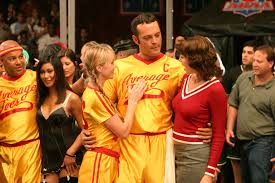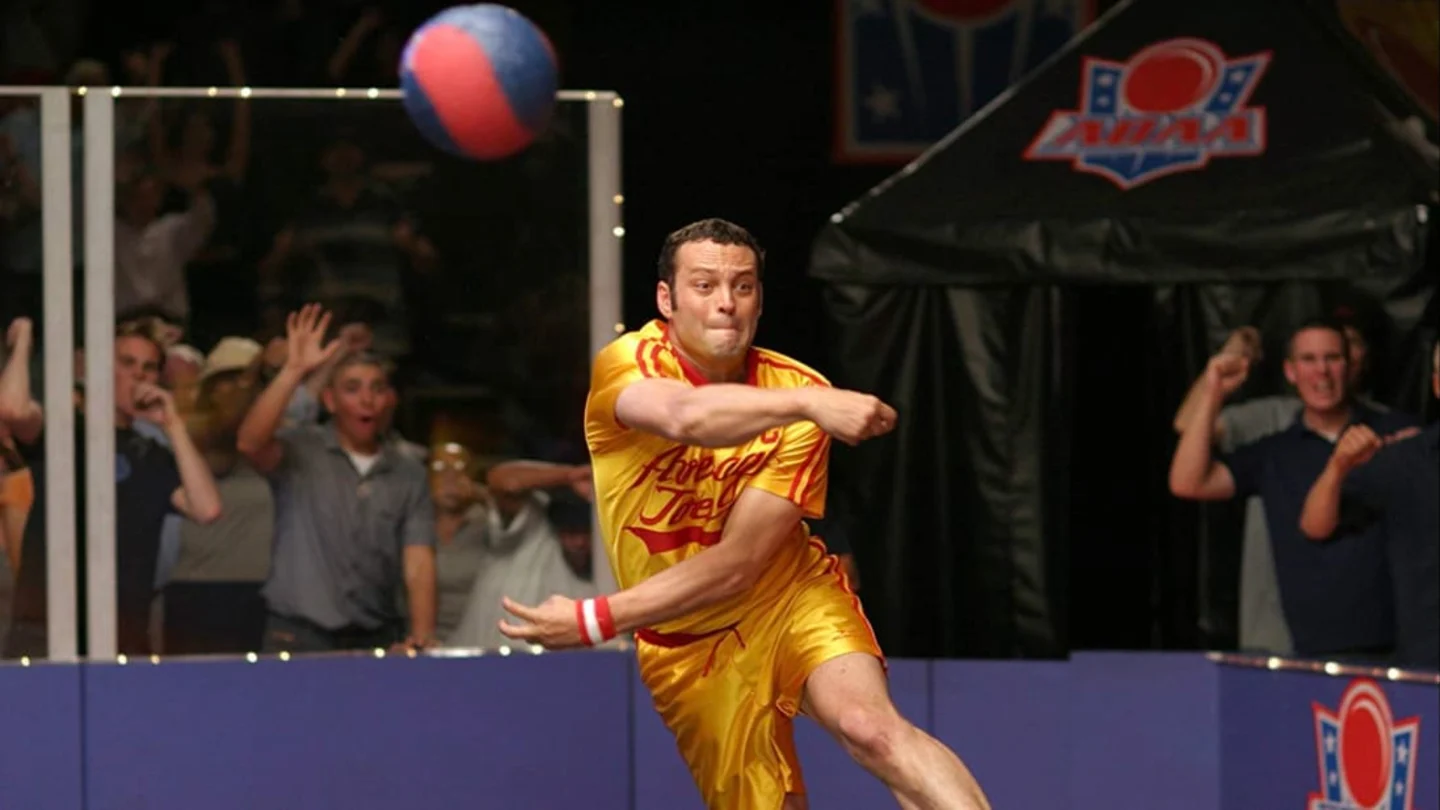Dodgeball

Dodgeball: A True Underdog Story 2 (2026)
Starring: Vince Vaughn, Ben Stiller, Christine Taylor
Directed by: Rawson Marshall Thurber
Genre: Comedy, Sports, Underdog Adventure
A Return to Chaos, Comedy, and Courage
Two decades after the original underdog sensation took audiences by surprise, Dodgeball: A True Underdog Story 2 (2026) returns with the same chaotic charm, the same lovable losers, and the same wildly exaggerated sportsmanship that made the first film a comedy classic. But this time, the stakes are higher, the opponents are stranger, the gyms are shinier, and the old feud between Average Joe’s and Globo Gym is burning hotter than ever.
The film opens with Peter LaFleur, once a reluctant gym owner and accidental dodgeball champion, now fully embracing his identity as the king of average. Average Joe’s, still proudly unimpressive, still held together by mismatched equipment and optimistic delusion, is barely limping along. Peter hasn’t changed—he’s older, a little wiser, but still allergic to ambition. That is, until he receives devastating news: the gym is facing foreclosure again. Bills are piling up, debts are spiraling, and Average Joe’s risks being wiped from the map permanently.
Peter’s answer isn’t brilliance or strategy. It’s the same kind of half-baked, last-minute idea that made him a champion years ago. He decides, with absurd confidence, that the only way to save his gym is the same way he saved it before—another dodgeball tournament. But this time, it’s bigger, meaner, and streaming live to millions of viewers. The prize? Fifty thousand dollars. The location? Las Vegas. And the competition? Peter’s old nemesis, White Goodman.
White Goodman: Bigger, Louder, and More Unhinged Than Ever
White Goodman, now a fully unhinged icon of self-obsessed fitness culture, has rebuilt Globo Gym into a monstrous empire of corporate vanity. Think mega-trainers, neon-lit torture-equipment, protein shakes that look like battery acid, and members who take their “glow up” as seriously as military boot camp. White himself is a spectacle—a man fueled by ego, hair gel, and an unshakeable desire to crush Peter LaFleur once and for all.
When White learns that Peter is entering the tournament, his obsession reignites like a volcano of insecurity. He throws his full Globo Gym army behind the competition—not because he needs the money, but because he refuses to let Peter “win at anything in life, even by accident.” His training camps are ridiculous, intense, and deeply unhelpful, featuring routines like throwing wrenches while shouting affirmations and meditating in full-body compression suits.
White Goodman is no longer just a competitor. He becomes the embodiment of perfectionism gone mad, a cartoonish tyrant of muscle culture, and the ultimate opponent for Peter’s chaotic band of misfits.
The Underdogs Return: A New Generation of Misfits Joins the Mayhem
Peter gathers a new team, though “team” is a generous word. Average Joe’s has always been more of a collection of characters than athletes. Returning favorites appear in hilarious cameos, while new misfits step forward to fill the vacuum of incompetence.
Among them:
-
A self-proclaimed pirate whose commitment to character is somehow stronger than his ability to aim.
-
A sci-fi-obsessed nerd who can calculate dodgeball trajectory with terrifying precision—but panics when someone throws a ball at him.
-
A random guy who walked into the gym one day and never left, despite not being entirely sure what dodgeball is.
-
An ex-yoga instructor who claims to be able to “bend around incoming projectiles,” though science disagrees.
-
A disgraced former athlete whose relationship with sports is complicated but whose heart is firmly in the right place.
Together, they create a team that is hilariously unprepared yet somehow determined. Their practices are a disaster—worse than the first film’s, which feels like an accomplishment. Balls fly everywhere, half the players can’t catch, and several misunderstand the rules entirely. But their chemistry, spirit, and sheer refusal to give up become the beating heart of the film.
Peter LaFleur becomes the reluctant leader once again, torn between despair at his team’s incompetence and quiet pride at their effort. His arc is about rediscovering belief—not in winning, but in trying with everything you’ve got.
The Vegas Tournament: Bigger, Wilder, and Absolutely Absurd
When the team arrives in Las Vegas, the movie ignites into comedic chaos. The tournament is broadcast like a reality show, filled with dramatic lighting, slow-motion entrance shots, and an announcer who thinks dodgeball is “the future of human entertainment.”
The opponents are as outrageous as ever:
-
A team of gymnasts who dodge by flipping and tumbling in mid-air.
-
A group of retired wrestlers who treat dodgeball like a battle for their souls.
-
A rival team made entirely of magician’s assistants who vanish whenever the balls start flying.
-
A pair of middle-school teachers who use classroom discipline as a weapon.
The matches are over-the-top, choreographed with exaggerated slow-motion sequences, comedic falls, and impossible dodges. The film retains the physical humor of the original, but amplifies it with clever modern twists—high-tech scoreboards, unpredictable obstacles, and viral moments that spark instant internet memes.
Each match tests Peter’s team physically and emotionally. They’re out-muscled, out-trained, and outmatched in every possible way—but never out-hearted. Their progress becomes the emotional core of the story: victory isn’t guaranteed, but courage is.
Peter vs. White: A Rivalry Reborn
The film builds toward the inevitable showdown between Average Joe’s and Globo Gym. The tension is both hilarious and triumphant. White Goodman arrives at the finals with all the theatrics of a self-anointed warrior-king—riding in on a treadmill-shaped platform, shirt glittering like a disco ball, shouting motivational nonsense.
Peter, by contrast, shows up with quiet determination. He may not have White’s muscles or theatrics, but he has something more important: a team that believes in him, a gym worth fighting for, and a heart big enough to fuel an entire army of underdogs.
Their final match is a masterclass in comedic sports storytelling—exaggerated, emotional, unpredictable, and deeply tied to the spirit of the original film. The crowd roars. Balls fly. Confetti explodes. White Goodman loses his mind in increasingly spectacular ways. And in the end, the true heart of the story emerges:
Winning is not about the scoreboard. It’s about showing up, trying, and risking everything for what matters.
Themes: Heart, Humor, and the Power of Trying
Dodgeball: A True Underdog Story 2 is more than slapstick comedy. Beneath the absurdity lies a message about resilience in the face of failure. It celebrates imperfection, embraces chaotic dreams, and reminds audiences that you don’t have to be the best to make a difference.
Peter’s growth is genuine: he begins the film discouraged, afraid of repeating the past, but ends rediscovering his courage. His team evolves from misfits into a family—united not by skill, but by a shared refusal to quit.
White Goodman represents everything toxic about perfectionism, obsession, and ego. His downfall is both comedic and symbolic: he fails not because Peter beats him, but because he cannot accept being average.
The film honors the spirit of the original by proving that underdogs are timeless. Whether in 2004 or 2026, audiences will always cheer for the ones who try against all odds.
Conclusion: A Hilarious, Heartfelt Return to a Comedy Classic
With its blend of wild humor, nostalgic callbacks, fresh comedic energy, and an uplifting story of perseverance, Dodgeball: A True Underdog Story 2 revives the spirit of the original in spectacular fashion. Vince Vaughn brings warmth and charm; Ben Stiller delivers another unforgettable comedic villain; Christine Taylor shines with heart and sharp wit. Rawson Marshall Thurber’s direction captures everything fans loved before—while amplifying it for a new era.
This is not just a sequel. It’s a celebration of average people doing extraordinary things—by accident, on purpose, and with absolutely no coordination.
A feel-good comedy for anyone who’s ever been told they couldn’t win.
In this world, you don’t need to be the strongest or the fastest.
You just need to be brave enough to dodge, duck, dip, dive—
and dodge.











